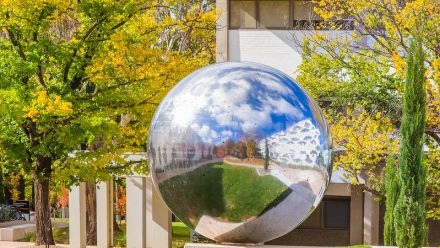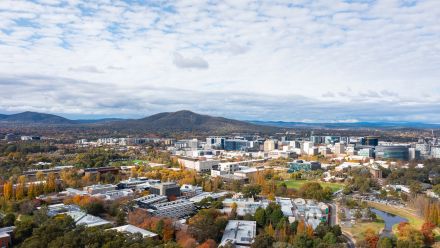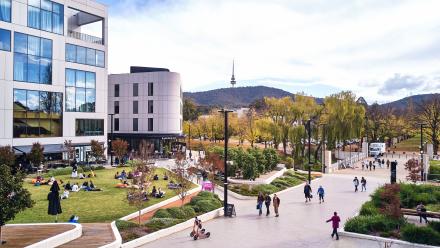Righting past wrongs
Then - Leading reconciliation
As white Australia started its reconciliation with Indigenous Australians, the Federal Government turned to one of the brains behind ANU to lead the way.
Dr Herbert 'Nugget' Coombs had been instrumental in the founding of ANU in 1946 and as a member of the Academic Advisory Council had steered the University through its first two decades while rising to become the first Governor of the Reserve Bank of Australia.
In 1968, the year Coombs became ANU Chancellor, he was named as Chairman of the Australian Council for Aboriginal Affairs, which was created after the 1967 referendum that gave the Federal Government powers to legislate specifically for Indigenous people.
The Council consisted of Coombs, experienced ANU anthropologist Professor Bill Stanner and senior public servant Barrie Dexter. Together, they gave the clout to the push for Aboriginal Affairs within the government's agenda.
Three years later, Coombs became an advisor to soon-to-be Prime Minister Gough Whitlam and largely wrote Labor's policy on Aboriginal affairs, particularly the breakthrough commitment to land rights.
The commitment to land rights grew out of Stanner's work at ANU in the 1950s. His work on Aboriginal religion and The Dreaming broke down many barriers.
Archaeological fieldwork conducted by the ANU Research School of Pacific Studies transformed understanding of Aboriginal Australia, dispelling myths and revealing a society much richer and older than first thought.
Stanner's work influenced a group of ANU anthropologists and the University has since been at the heart of a string of Native Title claims.
Indeed, the rights and interests of indigenous people around the world, including Indigenous Australians, are where the passions of Professor Mick Dodson AM lie today.
For more than three decades, Dodson has pushed for greater representation of indigenous peoples in academia and beyond and has been at the heart of land rights cases across Australia.
He has long fought for recognition of Indigenous Australians in the Australian Constitution and advocated this position as chairman of the Australian Institute of Aboriginal and Torres Strait Islander Affairs. It's a commitment that led to him being named the 2009 Australian of the Year.
As Director of the National Centre for Indigenous Studies at ANU, Dodson has continued to enhance the University's high levels of multidisciplinary research into Aboriginal and Torres Strait Islander cultures that has led the field for decades.
He also wants to increase the numbers of Indigenous students at all universities, including ANU. Numbers have increased significantly over the past two decades and Dodson cites the introduction of the Tjabal Indigenous Higher Education Centre at ANU - which guides Indigenous students through the large cultural shift - as a key to this success.
Today, ANU stands at the heart of the reconciliation effort and the University's multidisciplinary research continues to inspire Dodson and his fellow academics.
An economic path forward
Reconciling rival visions of Indigenous economic development means Dr Katherine Curchin is at the forefront of understanding how societies interact in Australia.
Curchin is comparing and evaluating the two very different sets of economic ideas promoted by lawyer and land rights activist Noel Pearson and ANU Emeritus Professor Jon Altman in her role as Research Fellow under an Australian Research Council Discovery Early Career Researcher Award.
While Pearson calls for greater mainstream economic integration, Altman's Indigenous hybrid economies theory is also important.
"What I'm looking into is how you partially commodify cultural knowledge without fully commodifying it," Curchin says.
"Indigenous art is a good example of success in this area. The achievements of Indigenous rangers are also fascinating.
"People can provide services that are beneficial to their country and their culture and gain an economic benefit from it too."
Curchin's PhD thesis at ANU focused on the ethics of criticism of other cultures and she sees links between that work and her current work at the ANU Centre for Aboriginal Economic Policy Research.
"The intercultural dialogue in countries such as New Zealand and the US is distorted by sensationalist media," she says.
"Only through building relationships between Maori, for example, and settlers can fruitful conversations start. We face this same issue in Australia."


